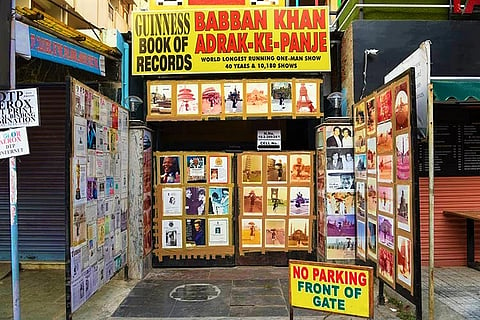

For those born in the digital era, it may be difficult to believe but there was a time when Hyderabad’s crowds found wholesome entertainment in theatre. Most Hyderabadis of that period would report that there was a particular stage show that they watched not just multiple times but many times across the years too.
Adrak ke Panje, a Hyderabadi comedy play, was first staged on September 22, 1965 and went on to have more than 10,000 shows across the world before ending in February 2001. The play has the honour of getting into the Guinness World Records in 1984 for being the longest running one-man show. It was watched not just by Hyderabadis but by millions across the world, and was translated into many languages and performed in India and around the world.
Conceived in the era of intensive family planning policies, Adrak ke Panje was woven around the travails of the protagonist who struggles to make ends meet and take care of a family consisting of his sassy wife and many children and an extended circle of helpful friends.
The appeal of the play was in the hilarious one-liners generously smattered across the script, which was said to be written by the author Babban Khan sitting under a streetlight. The legend goes that Babban Khan had to sell his mother’s jewellery to arrange for the first show.
The play evokes nostalgia among Hyderabadis thanks to the earthy flavour of the Hyderabadi Dakhni language and the lilting accent that was used in the play. Old-timers recall how the house roared to Babban Khan’s nok-jhok with his wife, in the background of daily demands of his large family and quirky friends.
Fifty-four years after the play made its debut, Hyderabad’s comedy scene is still flush with talent, albeit unmatched to the legendary success of Adrak.
After movies made on shoestring budgets, such as Hyderabad Nawabs, targeting youth from Hyderabad’s Old City, enthusiastic filmmakers from the city have taken to the YouTube platform, making catchy, crisp episodes based around Old City’s life and ways. Aziz Naser, Mast Ali, Gullu Dada, and later on Shahbaaz Khan, Ayesha Khan, Sharjeel and others became immensely popular for their performances. Their fame was such that they landed roles in Telugu and Hindi feature films. Popular comedian Raju Shrivastav also played a cameo in the first Hyderabad Nawabs. Noor Bhai, Mama, Pappu, Munna, Hanif Bhai and Ajju Tehzab were characters that resonated with the youth and had the whole theatre in splits. Before that, The Angrez, was another superhit, with a story set around Hyderabad’s IT boom and its vagaries with hilarious potshots at on-site returned techies.
The appeal of the shows lies probably as much in the humorous presentation as the serious, contemporary social issues that young people can relate to. Employment, poverty, displacement, street dynamics, inter-community romance, financial struggles, family issues constitute the crux of the stories, told in an exaggerated, light-hearted way, built upon the idiosyncratic characters that people get to see around them.
It is hard to say if the generation being fed on a global, homogenised, dry humour can appreciate the bordering-on-slapstick comedy of Adrak anymore, but the Dakhni language retains its charm even if the format has changed. The popularity of the Hyderabadi comedy thrives with the characters, actors and dialogues being hot topics of midnight conversations on chabutras of the houses.
As more avenues open up to showcase histrionic talent, acting institutes have sprouted in the Old City area, with courses offering ‘placement’ even by way of roles in short films. And it appears that the Hyderabadi Dakhni language has not only found some kind of a cultural revival but has also emerged as a tool for success.
Wajeed Ullah Khan is a Hyderabad-based freelance journalist.